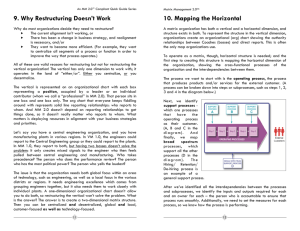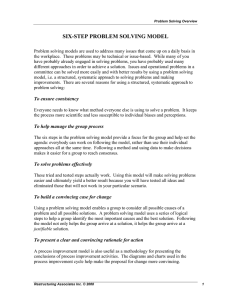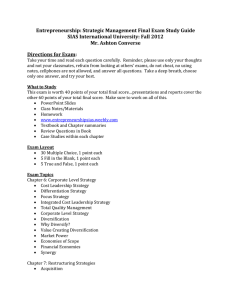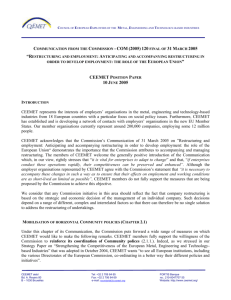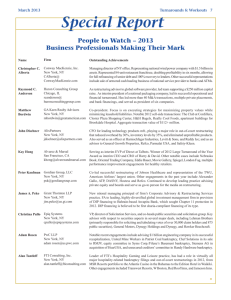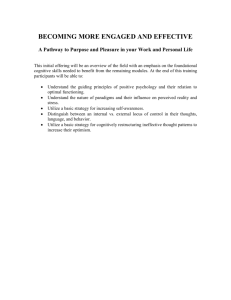Document 10467229
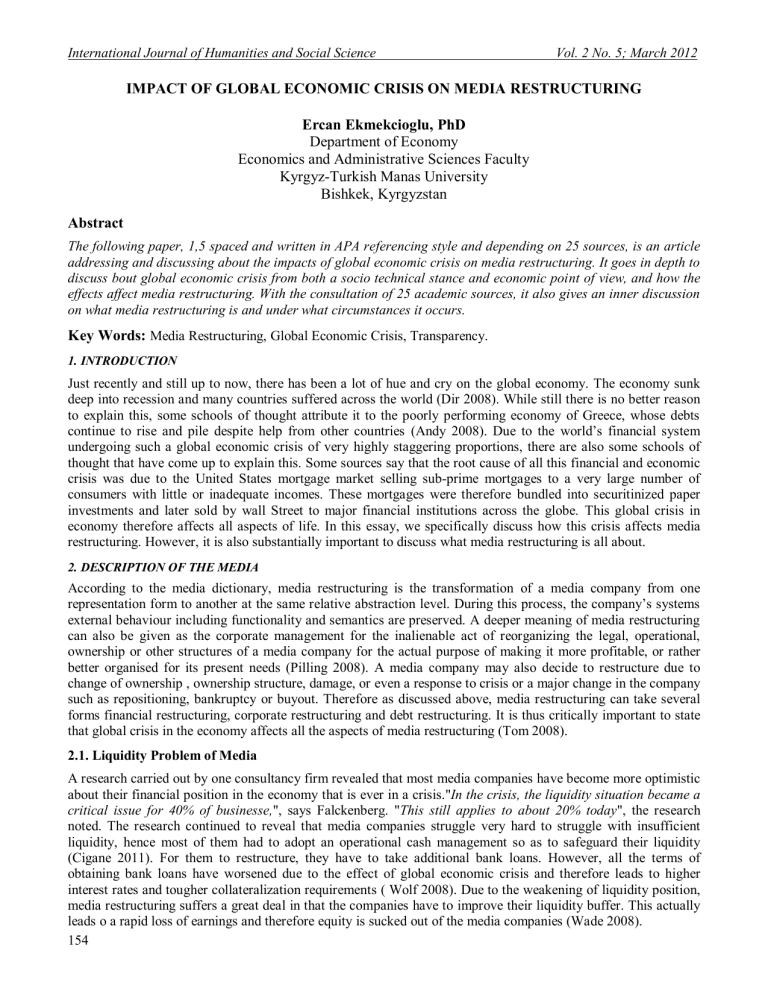
International Journal of Humanities and Social Science Vol. 2 No. 5; March 2012
IMPACT OF GLOBAL ECONOMIC CRISIS ON MEDIA RESTRUCTURING
Ercan Ekmekcioglu, PhD
Department of Economy
Economics and Administrative Sciences Faculty
Kyrgyz-Turkish Manas University
Bishkek, Kyrgyzstan
Abstract
The following paper, 1,5 spaced and written in APA referencing style and depending on 25 sources, is an article addressing and discussing about the impacts of global economic crisis on media restructuring. It goes in depth to discuss bout global economic crisis from both a socio technical stance and economic point of view, and how the effects affect media restructuring. With the consultation of 25 academic sources, it also gives an inner discussion on what media restructuring is and under what circumstances it occurs.
Key Words:
Media Restructuring, Global Economic Crisis, Transparency.
1. INTRODUCTION
Just recently and still up to now, there has been a lot of hue and cry on the global economy. The economy sunk deep into recession and many countries suffered across the world (Dir 2008). While still there is no better reason to explain this, some schools of thought attribute it to the poorly performing economy of Greece, whose debts continue to rise and pile despite help from other countries (Andy 2008). Due to the world’s financial system undergoing such a global economic crisis of very highly staggering proportions, there are also some schools of thought that have come up to explain this. Some sources say that the root cause of all this financial and economic crisis was due to the United States mortgage market selling sub-prime mortgages to a very large number of consumers with little or inadequate incomes. These mortgages were therefore bundled into securitinized paper investments and later sold by wall Street to major financial institutions across the globe. This global crisis in economy therefore affects all aspects of life. In this essay, we specifically discuss how this crisis affects media restructuring. However, it is also substantially important to discuss what media restructuring is all about.
2. DESCRIPTION OF THE MEDIA
According to the media dictionary, media restructuring is the transformation of a media company from one representation form to another at the same relative abstraction level. During this process, the company’s systems external behaviour including functionality and semantics are preserved. A deeper meaning of media restructuring can also be given as the corporate management for the inalienable act of reorganizing the legal, operational, ownership or other structures of a media company for the actual purpose of making it more profitable, or rather better organised for its present needs (Pilling 2008). A media company may also decide to restructure due to change of ownership , ownership structure, damage, or even a response to crisis or a major change in the company such as repositioning, bankruptcy or buyout. Therefore as discussed above, media restructuring can take several forms financial restructuring, corporate restructuring and debt restructuring. It is thus critically important to state that global crisis in the economy affects all the aspects of media restructuring (Tom 2008).
2.1. Liquidity Problem of Media
A research carried out by one consultancy firm revealed that most media companies have become more optimistic about their financial position in the economy that is ever in a crisis." In the crisis, the liquidity situation became a critical issue for 40% of businesse, ", says Falckenberg. " This still applies to about 20% today ", the research noted. The research continued to reveal that media companies struggle very hard to struggle with insufficient liquidity, hence most of them had to adopt an operational cash management so as to safeguard their liquidity
(Cigane 2011). For them to restructure, they have to take additional bank loans. However, all the terms of obtaining bank loans have worsened due to the effect of global economic crisis and therefore leads to higher interest rates and tougher collateralization requirements ( Wolf 2008). Due to the weakening of liquidity position, media restructuring suffers a great deal in that the companies have to improve their liquidity buffer. This actually leads o a rapid loss of earnings and therefore equity is sucked out of the media companies (Wade 2008).
154
© Centre for Promoting Ideas, USA www.ijhssnet.com
This forces the companies to build a comfortable equity position, which takes a lot of costs and hence loss. As a result of this, media restructuring and development is negatively affected.
2.2. Digital Media
However, it is also important to note that the economic crisis can greatly help in a very bigger way to develop digital media. Advertising budgets can considerably and dramatically be slashed while all the remaining advertising expenditures strictly monitored. A company won’t afford to embark on its advertising campaign that can prove ineffective (Ravallion 1996). All advertisers want to see a substantial proof of the effectiveness of their campaign. Consequently, advertising duration has been shortened radically. These leads to competitive struggle among media companies so as to survive in a constantly changing environment. Prior financial investments and some favorable conditions can therefore provide maximum effectiveness. This is the main consequence of the crisis to the advertising market (Krugman 2008).
The internet will continue to grow at a tremendous pace despite the global economic crisis. For the very young and progressive thinking audience, internet remains the best media for all and hence overcomes other media during such a period as the global economic crisis. TV becomes the second in spite of the growing cost of the advertising in the central channels. There are doubts that TV is not able to reach all the people but however, it continues to be a nationally favored media (Dyer 2008).
Radio, magazines, and newspapers are going through difficult times, and looking for advertisers. More again, it seems that the Internet-dimension has the advantage. To sum up, during this economic crisis, digital media will remain a priority and will continue to receive financial backing.
2.3. Effects of Economic Crisis for the Media
As capital has fled, and the global credit crunch ensuing has been able to freeze the arteries of a global economy which is based on easy cheap credit. Media companies are being denied the normal flows of credit. There is therefore a massive global economic crisis in transforming and restructuring the media. This evolving financial and global crisis thus afflicts developed and developing media companies, which thus leads to a massive unemployment, price deflation among many pivotal assets classes and demand destruction. The attempts to tame this are proving ineffective. However, many economists are speculating that the global economic crisis will lead to a worldwide recession of many economies, therefore media companies plans for reconstructions of media companies will be affected in a very negative way. Even the attempts by the Federal Reserve Bank and the
Treasury Department of the US to clandestinely inject liquidity into the credit market with interventions by central banks in other developed economies proves a devastative step, and therefore media will not be spared.
A research that was ones carried out about the impacts of global crisis on media showed that restructuring is bound to fail in the future. The findings of the research were that all media across the world have lost 30 up to
60% of their income due to the global economic crisis. The report revealed that the media were forced to adopt cost saving measures including reducing the volume, laying off their staff, reduced investigative reporting and massive cuts in provincial and international coverage. The report went further to say that so many media markets have experienced a massive flight of foreign investors and a lot of bankruptcies of independent outlets. This then led to an overall drop in the quality of news delivery to citizens. The bigger impact of this is that the media content has become shallower, more entertainment centered , increasingly isolationist and therefore become more prone to political and business influences and lacking in investigative bite (Martin 2009). This therefore moves the media further away from restructuring.
2.4. Media Ethics
As had been noted earlier, the economic recession of the world have influenced so many sectors in the economy.
This later led to creation of losses, bankruptcies and unemployment. Though media is regulated by specific laws due to its critical public role, their profits continued to decreased. This forced the media to change from grace to grass, while concentrating on personality centered and scandal oriented reporting. This therefore has been able to put pressures on the actual independence of the editorial policies and the honesty of journalists and therefore prevents the public from participation in more of a quality exchange of views and opinions that is substantially fundamental of a democratic system of good governance (Shaohua 2009). Many countries reacted in a more severe way so as to oppose this developments by strengthening the role of public media and passing laws that increase transparency of media ownership.
155
International Journal of Humanities and Social Science Vol. 2 No. 5; March 2012
These efforts were however weakened by the increasing necessity to run highly austerity budgets and the inability to ensure full transparency in the ownership of the media due to globalized business ownership and which is always affected by the global economic crisis (Chen 2008).
3. CONCLUSION
In conclusion, there are more negatives that come with the global economic crisis to the media than there are positives, and therefore it is critical to note that restructuring under the current economic crisis can only take place on a small margin, if not any.
REFERENCES
Tom F. (2008) The Financial Crisis and its Impact on Journalism http://www.siliconvalleywatcher.com/mt/archives/2008/09/the_financial_c.php, Retrieved on 6/12/2011.
Cigane et al(2011) Impact of the economic crisis on the media: dangers to the fundamental human rights .
http://assembly.coe.int/Documents/WorkingDocs/Doc11/edoc12596.htm. Retrieved 6/12/2011.
What’s happening to the economy?’ (Socialist Outlook no.14, February 2008), A Kilmister `The world economy and the credit crisis’ (Socialist Resistance no.51, Summer 2008)
Wolf M ( 2008) ` How Britain flirts with disaster’ (Financial Times November 28 2008, p.11)
R Wade (2008) financial regime change ? (New Left Review Second Series no.53 September/October 2008 p.11)
Krugman P (2008) We all go together when we go ’ (The Guardian Weekend December 6 2008 p.3
Dyer G (2008) ` Paulson in last stand against weaker renminbi
’ (Financial Times December 4 2008 p.11)
Pilling D (2008) Prudent Asia is unlikely to bail out the west
’ (Financial Times December 11 2008) p.13).
Kilmister A ` Understanding neo-liberalism ’ (Socialist Outlook no.3 Spring 2004) Chen, Shaohua and Martin
Ravallion, (2008), “ The Developing World is Poorer than we Thought, but no less Successful in the Fight against Poverty ,”Policy Research Working Paper 4703, World Bank.
Development Research Group,( 2008), “ Lessons from World Bank Research on Financial Crises, ” Policy Research
Working Paper 4779, World Bank.
Ravallion, Martin, (2009), Bailing Out the World’s Poorest,” Challenge . 52(2): 55-80. World Bank, 2008, Global
Economic Prospects, World Bank, Washington DC.
Ferreira, Francisco and Norbert Schady. “
Aggregate Economic Shocks, Child Schooling and Child Health
.” Policy
Research Working Paper 4701, World Bank
Ferreira, Francisco and Martin Ravallion (2009) Poverty and Inequality: The Global Context”, in Wiemer Salverda,
Brian Nolan and Tim Smeeding (eds), The Oxford Handbook of Economic Inequality , Oxford: Oxford
University Press
Shaohua C. (2009) The impact of the global financial crisis on the world’s poorest.
http://www.voxeu.org/index.php?q=node/3520. Retrieved 6/12/2011.
Andy K. (2008) The Economic Crisis and its Effects http://www.internationalviewpoint.org/spip.php?article1581.
Retrieved 6/12/2011
Global Financial Crisis (2010), http://www.globalissues.org/article/768/global-financial-crisis. Retrieved 6/12/2011
Dir W. (2008) Effects of the Global Financial Crisis on Developing Countries and Emerging Markets - Policy responses to the crisis . http://www.odi.org.uk/resources/details.asp?id=2613&title=effects-global-financialcrisis-developing-countries-emerging-markets-policy-responses-crisis. Retrieved 6/12/2011.
African Development Bank (2009) Africa and the global economic crisis: strategies for preserving the foundations of long-term growth. Tunis .
Ravallion M ( 1996) Are the poor protected from budget cuts? Evidence from Argentina.
Journal of Applied Economics.
Baird S, Schady N, Friedman J (2007) Infant mortality over the business cycle in the developing world. Policy
Research Working Paper No. 4346 . Washington, DC: The World Bank.
Knowles J, Pernia E, Racelis M (1999) Social consequences of the financial crisis in East Asia . Manila: Asian
Development Bank.
156

